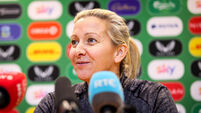Jose Mourinho’s mind gives Chelsea title edge

This wasn’t what Courtois had signed up for. The reason behind it, however, was Mourinho wanted to properly find out what he had signed up for with the goalkeeper.
Those at Stamford Bridge say it is a common strategy with the Portuguese when it comes to new players. Since he doesn’t deeply know them, Mourinho initially pushes their buttons to see how they react, and whether they have the mental resilience he thinks is essential to repeatedly win trophies.














